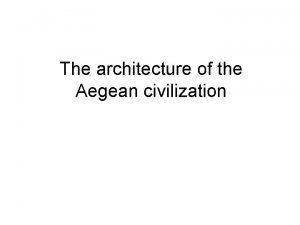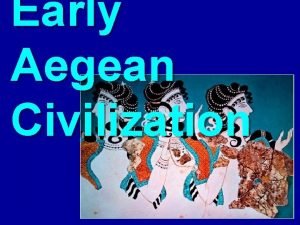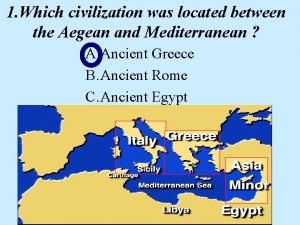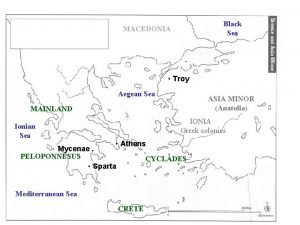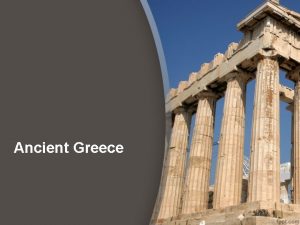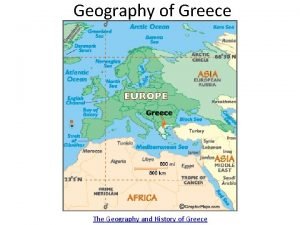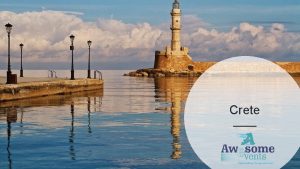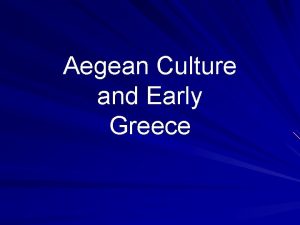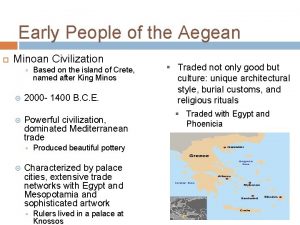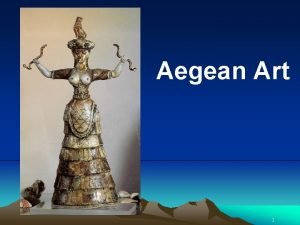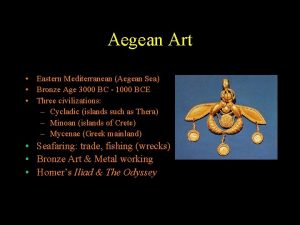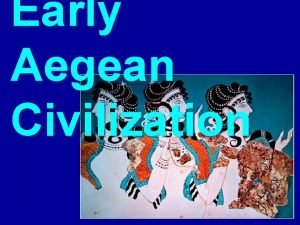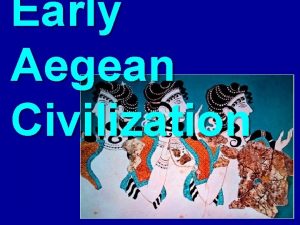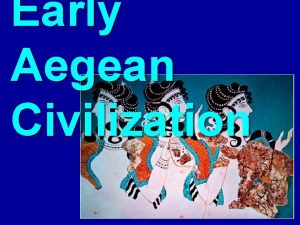Early People of the Aegean Crete Early civilization














- Slides: 14

Early People of the Aegean • Crete • Early civilization • Later influenced Greeks

Section 1: Early People of the Aegean Minoans Trade & Prosper • Minoans – Lived on Crete – Trade not conquest Frescoes �Minoan civilization Knossos peaked 1600 bc 1500 bc

Minoans Frescoes: watercolor paintings done on wet plaster; Covered walls of Knossos • 1400 bc, Minoan civilization vanished Sea was very important

Section 1: Early People of the Aegean Continued… • Mycenaeans – First Greekspeaking people (written record) – Invaders of Minoans �Dominated Aegean world 1400 bc-1200 bc �Sea Traders

Around 1250 bc The Trojan War • Started as rivalry between Mycenaean & Troy • Most widely known for the Greek legend of Paris, Helen, and the Trojan horse • After 10 years of battle, the Greeks finally seized Troy and burned it to the ground

• Not long after Trojan war, Mycenaens were attacked from sea raiders & Dorians (from the North) • People abandoned cities • Trade declined • Greek civilization stepped backwards Greece’s Dark ages 1100 bc-900 bc

Homer and the Great Legends of Greece • Homer was a blind poet that wandered singing great epics • 750 bc • Much of what we know of Trojan War & life during these times

The Iliad. The Odyssey • Trojan War – Chief source of info • Full of gods & goddesses • Achilles, withdrew from battle because he was insulted by his commander �Struggles of Greek hero Odysseus on his return home to his wife Penelope after fall of Troy �Encounters sea monster, one-eyed giants, & a beautiful sorceress Epics reveal values of ancient Greeks Heroes display honor, courage, & eloquence

Section 2: The Rise of Greek City-States • Balkan Peninsula • Extends into the Mediterranean Sea • Comprised of hundreds of rocky islands • Greeks developed polis or city -states Ancient Greeks didn’t have a large empire A collection of city-states (Fiercely defended independence, frequent wars)

Geography Shapes Greece • Mountains separated city-states but seas linked them to outside world • Skilled sailors – They traded olive oil, wine, and marble for grains and metals. • The Greeks adapted ideas from other civilizations – Alphabet from the Phoenicians

Governing City-States • 750 bc, rapid population growth & Greeks expanded – On top of the city was the acropolis, or high city. Temples dedicated to the gods and goddesses were located here. – Beneath the acropolis was the marketplace and homes

Governing City-States • Citizens shared a sense of responsibility • Free men spent much time in marketplace debating • Whole community joined festivals honoring gods/goddesses • Male landowners held all political power Types of Government

Governing City-States Types of Government • Monarchy- A hereditary ruler with central powers. • Aristocracy- Rule by hereditary landowning elite. • Oligarchy- Power is in the hands of a small wealthy elite.

Warfare • 650 bc, iron weapons replaced bronze – Cheaper – Ordinary citizens could afford weapons, shields, helmets, etc. • Phalanx – Tactical military formation with armed foot soldiers
 Nestor aegean
Nestor aegean How did geography help shape greek civilization
How did geography help shape greek civilization The earliest aegean civilization was located
The earliest aegean civilization was located Nilufer organized industrial zone
Nilufer organized industrial zone Alliteration for beach
Alliteration for beach Aegean marine petroleum network inc
Aegean marine petroleum network inc Led soldiers across hellespont into anatolia goals
Led soldiers across hellespont into anatolia goals Aegean art
Aegean art Balkan peninsula in ancient greece
Balkan peninsula in ancient greece Aegean dividend miles
Aegean dividend miles Where is greece located
Where is greece located Contributors to our present gymnastics program
Contributors to our present gymnastics program Hiatus du sinus maxillaire
Hiatus du sinus maxillaire Palatin
Palatin Apophyse orbitaire externe
Apophyse orbitaire externe
